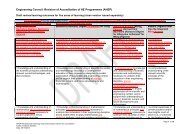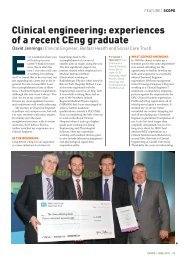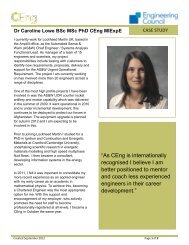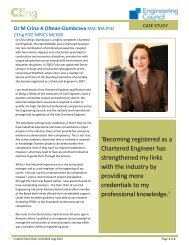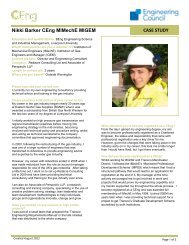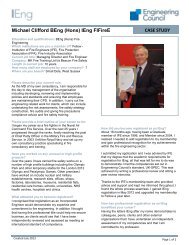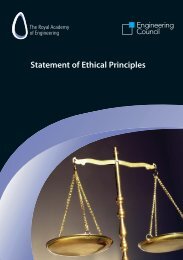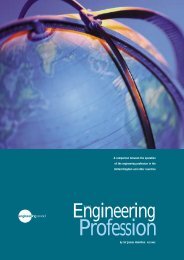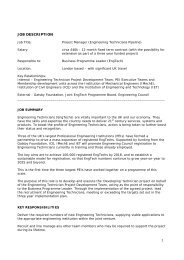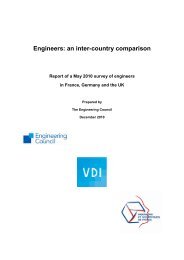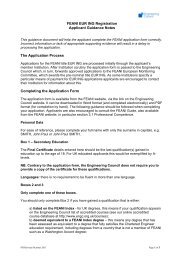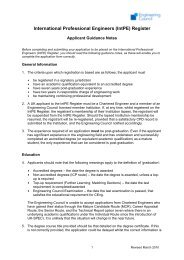An Engine for Change - A Chronicle of the Engineering Council
An Engine for Change - A Chronicle of the Engineering Council
An Engine for Change - A Chronicle of the Engineering Council
You also want an ePaper? Increase the reach of your titles
YUMPU automatically turns print PDFs into web optimized ePapers that Google loves.
98A CHRONICLE OF THE ENGINEERING COUNCILequipment or on travel and subsistence. With a certain amount <strong>of</strong> tongue in cheek <strong>the</strong> EngCgave <strong>the</strong> impression that this had been its intention all along.A pilot scheme began in 1991 <strong>of</strong>fering a Personal Development Logbook to engineeringstudents who satisfied <strong>the</strong> EngC’s Stage 1 (Education) requirements <strong>for</strong> IEng who hadregistered, but had not yet joined an <strong>Engine</strong>ering Institution.‘Attaining Competence in <strong>Engine</strong>ering Design (ACED)’ was published in April 1991 <strong>for</strong>students interested in this specialist area.The EngC Examinations were re-publicised throughout <strong>the</strong> UK during 1991, resulting inseveral thousand requests <strong>for</strong> details. <strong>An</strong> overseas publicity campaign was planned. Threenew preparation courses at colleges began in <strong>the</strong> UK, including a first in Nor<strong>the</strong>rn Ireland.Entries <strong>for</strong> <strong>the</strong> 1992 examinations increased by 7% <strong>for</strong> both UK and overseas candidatesbringing <strong>the</strong> total to 3,857. A fur<strong>the</strong>r three colleges submitted candidates <strong>for</strong> <strong>the</strong> first time, afeat that was repeated again in 1993. The aim and scope <strong>for</strong> <strong>the</strong> compulsory subject ‘<strong>Engine</strong>erin Society’ was revised in 1992 <strong>for</strong> <strong>the</strong> 1993 examination and new syllabuses were developedduring 1992 and 1993 in electrical, control and in<strong>for</strong>mation systems engineering in time <strong>for</strong><strong>the</strong> 1995 examination. Fur<strong>the</strong>r topics were considered and approved by <strong>the</strong> BER during 1995<strong>for</strong> incorporation into <strong>the</strong> in<strong>for</strong>mation systems’ papers.The EngC prepared a report in 1995 on ‘Competence-based Higher Education and <strong>the</strong>Standards methodology’, based on research by <strong>the</strong> University <strong>of</strong> East <strong>An</strong>glia and funded by<strong>the</strong> Employment Department. The report provided an overview <strong>of</strong> initial teacher training,vocational training <strong>of</strong> general medical practitioners, engineering education and environmentalscience.Top Flight BursariesFor students in <strong>the</strong> first year <strong>of</strong> an accredited engineering degree course ‘Top Flight –Bursaries <strong>for</strong> <strong>Engine</strong>ering Students’ was published in October 1993 as a prelude to <strong>the</strong> TopFlight Bursary Scheme. This scheme, devised to attract highly-talented people to a career inengineering, managed by <strong>the</strong> EngC and funded by <strong>the</strong> DEE was <strong>for</strong>mally launched in 1994.Students on, or about to embark upon, full-time, sandwich and part-time courses that satisfiedall <strong>the</strong> educational requirements <strong>for</strong> registration as Chartered <strong>Engine</strong>ers were eligible. Therewere 2,108 approved applications in 1994 and 2,220 in 1995. Some students withdrew,leaving 4,209 who received <strong>the</strong> £500 bursary <strong>for</strong> each year <strong>of</strong> <strong>the</strong>ir courses, in addition to<strong>the</strong>ir maintenance grants. The associated brochure was republished in August 1994, August1995 and July 1996.Towards an up-dating <strong>of</strong> SARTORResponding to changes in <strong>the</strong> schools’ National Curriculum and o<strong>the</strong>r significant educationprovision developments, three working groups under <strong>the</strong> executive direction <strong>of</strong> Pr<strong>of</strong>essorKeith Foster, Director <strong>Engine</strong>ering Pr<strong>of</strong>ession, were established by <strong>the</strong> EngC in 1991 to lookat (a) Needs, Demand and Supply, (b) Structure, Methods and Means, and (c) Standards <strong>of</strong>Attainment. The aim was to conduct a Review <strong>of</strong> <strong>Engine</strong>ers’ Formation to create a system <strong>of</strong><strong>Engine</strong>ering Education and Training that was more attractive, effective and appropriate toyoung people and <strong>the</strong>ir employers. A small steering group, chaired by Sir John Fairclough,© <strong>Engine</strong>ering <strong>Council</strong> UK 2004



